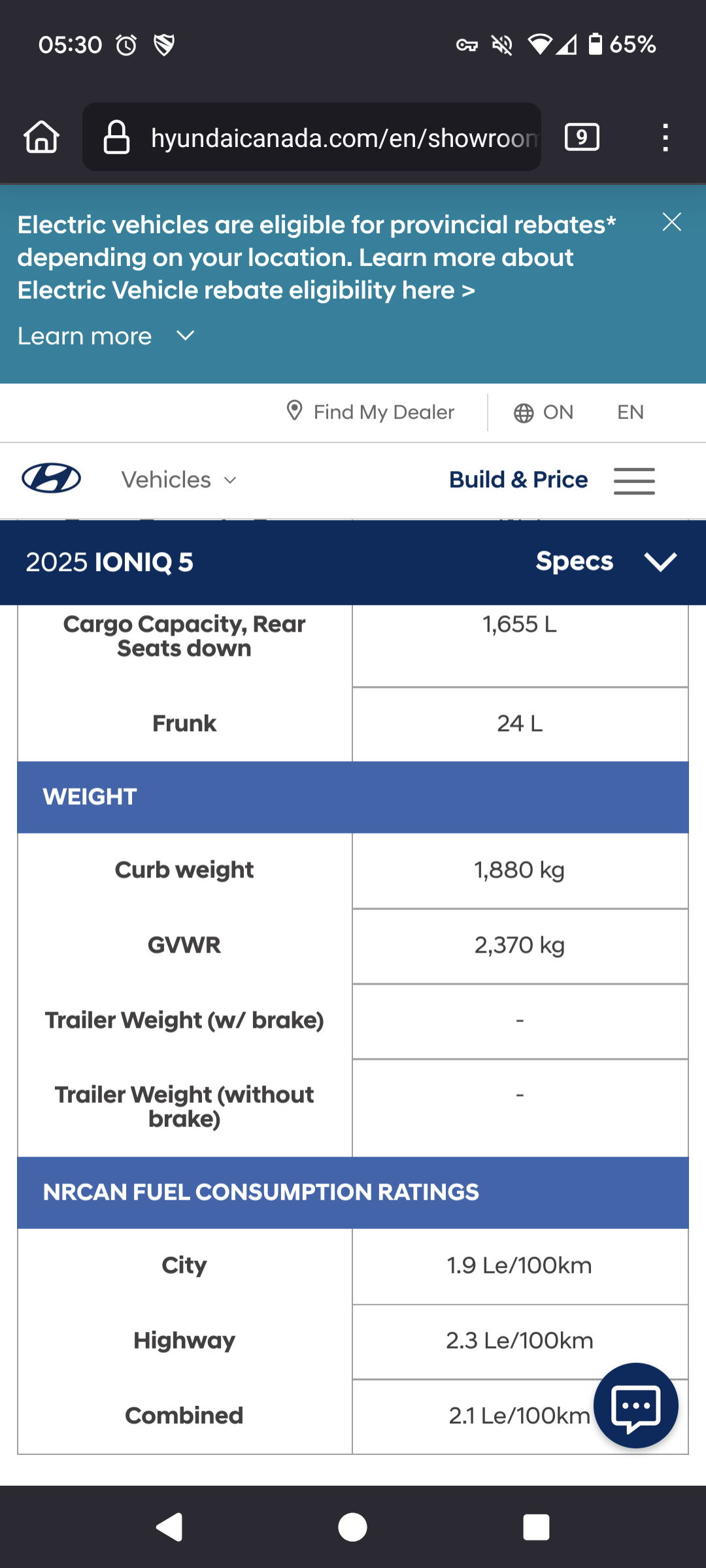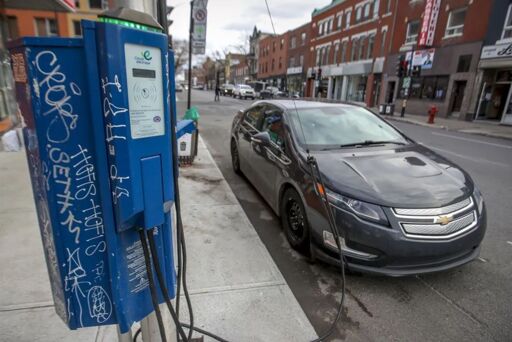What my 40yo diesel has going for it is that it already exists. The production cost has been paid for already. I’m fully prepared to buy an eV or hybrid when it dies but in the meantime it’s what I’ve got. Plus I don’t actually drive very much.
I made the calculation with a 10 years old Civic vs new EV once and the math came out in favor of the EV after a few years anyway, especially if you get green electricity where you live… Now with a 40 years old diesel it’s even worse considering how much diesel emissions equipment has improved since it was built. There’s a reason why some cities like Paris are completely banning older diesels…
You have to take into consideration that the total emissions from your already existing ICE vehicle keep increasing very quickly over time where an EV has a higher total when comparing two new vehicles, but then the EV has so much lower emissions during usage that they catch up very quickly, even if the electricity they use comes from coal powered generators. Hell, the average big truck probably release as much emissions every year as what it took to produce it in the first place…
Diesel has more NOx emissions and significantly more particulate emissions than cars running on gasoline, which is why cities are banning older vehicles running on Diesel. They’re harmful to people’s health, especially if they lack modern filters.
For CO2 though, Diesel usually runs miles around gasoline. That’s why the EU has favored Diesel engines over gasoline one’s since signing and ratifying the 1997 Kyoto protocol to reduce greenhouse emissions.
CO2 is directly related to fuel economy (no filtration of it) which is why diesel do better than gas. OP has a 40 years old diesel truck though, I wouldn’t expect it to be getting that great fuel mileage, especially not if they’re from the US.
Fair enough, older cars absolutely have worse fuel economy. I wonder how much this is offset by US trucks growing in size and weight though - a modern gasoline truck may even have worse fuel economy despite 40 years of advances. Although that’s not a high margin to clear to be honest.
Any chance you can source your numbers? I tried to do the same calculation for my 18 year old gas car, and it came out a being a wash.
Finding hard numbers on the energy cost to build a new car was tough - the green sites showed the EV car poofed into the world with magic and butterflies, while the gas-centric sites made it sound like it took the entire world’s GDP to produce a single EV.
Also disheartening, the very few sites I could find that would list replacement costs for a battery pack had the price higher than the vehicle itself - IE, when the battery pack goes, you throw the car away & buy another one. That’s been a huge turnoff for me.
I’m trying to find the source again, from memory the production itself was 2 tons of CO2 for a compact sedan and 8.5 tons for an equivalent EV and then the Civic (and that’s numbers I’ve just checked) emits about 3 tons of CO2 a year driving 16k km (which is less than the US average) while the EV emissions will vary depending on what is used to produce the electricity, but after two years the gas car has polluted as much as producing the EV and then a year later if it’s green electricity it was above the EV…
So if you take a Civic that’s already on the road and replace it with an EV you don’t include the original 2 tons from producing the Civic, but it only means three years of CO2 emissions from burning gas before it catches up with the EV production.
From memory after about 6 years the EV came out on top even if it was replacing a road worthy Civic even in the worst scenario…
We have to keep in mind that producing electricity from petrol is more efficient than using that petrol to move cars (even with the losses along the way) as car engines aren’t that great at extracting energy from gas…
Edit: just wanted to add that if we don’t just look at CO2 the same logic applies to other types of emissions and replacing old cars with newer cars even if both are petrol powered and it even applies to CO2 if someone is driving an inefficient car and is thinking that replacing it with a more efficient new car will be worse for the environment…
I generally agree, but I’ve driven 14,000kms in six years. I just don’t drive that much.
Unless your vehicle has particularly bad emotions, generally speaking that’s the recommendation. All vehicles have a front-facing emissions cost from their manufacture; EVs having more due to the battery materials. While it’s better in the long run to have an EV on the roads than a gas/diesel, there is value in maintaining an existing vehicle.
Like, I’m not sure how to properly convey the point but there’s something about reducing the market demand for a new car and its environmental impact. If someone were to trade in their old vehicle and buy a new one every few years (which is unfortunately pretty normal in the US for middle class’folks), they’d actually have a worse carbon footprint buying EVs because of those front-loaded emission costs.
The best step towards a greener future is cutting out unnecessary production rather than chasing the next gadget that’s supposed to save the world.
Not necessarily, an EV running on green electricity catches up in about 30k km if I recall correctly, that’s two years of driving.
The vast majority of ICE cars emissions come from their usage, not their production, so it’s environmentally beneficial to take them off the road and recycle as much of them as possible even if they’re still road worthy.
on average, Canadian EVs have up to 77% lower emissions than conventional models
That’s quite a bit less. The headline sounds like “Do ICE vehicles pollite less than EVs ?” is a valid question, is there any argument that’s the case? I’d have guessed EVs were obviously better, and you’d be hard pushed to argue otherwise?
(obviously I’m thinking ‘new ev’ vs ‘new ICE’ - putting second hard vehicles introducrs all sorts of caveats)
It might be due to a larger proportion of green energy sources powering these EVs, not sure how they calculate the emissions figures.
These kinds of studies usually go by the average emissions of the relevant country’s power generation.
Heres the relevant bit for this study though, it has both national and by province:
In addition, electric vehicles also benefit from the low-emissions intensity of electricity generation relative to gasoline in most parts of Canada. Comparing the lifecycle emissions of the two fuels on an equivalent energy basis, grid electricity emissions are 61% lower than those of gasoline at the national level and 20%-93% lower in the 8 provinces/territories whose grid electricity is cleaner than gasoline.6 A handful of provinces and territories have grids that are more emissions intensive than gasoline based on the 2023 domestic electricity generation profile (chart 2). That said, even in this latter group, most electric vehicles still have lower fuel-related emissions and lifetime emissions than comparable gasoline vehicles because they use less energy during operation. (See appendix for a breakdown of electricity generation by fuel type).
They go into detail. Most FF electricity will be 40%-60% effiency, though peaker plants can be as low as 25%. ICE to wheel efficiency is 18%, and natural gas is cleaner than oil to boot. Canada has a lot of hydro and nuclear.
A new EV pollutes more than using old ice until its end.
That might be the case, although this study is explicitly comparing new EV to new ICE right? (which seems like the relevant comparison)
It may study that indeed but the people picking between new ice or ev are the in overwhelming majority ones who already have a completely fine, new ish car that is good to go for decades. Most new planet saving EVs are produced without there being any real pressing need for them. Finishing up using all the existing cars would be hell lot better than replacing everything with Ev’s.
But that’s not how the car industry works. That “newish” car isn’t scrapped, it is sold to someone whose car died or wanted a newer used car. And then sold to someone with a worse or dead car. Very few “good” cars are being scrapped for EVs. Most cars being taken out of circulation are extremely old or totaled in an accident…
It is how it works but it shouldn’t if we want to be green, instead of appearing green.
Not where you live it doesn’t
Public Transit is even better
Does this take into account emissions from the exothermic combustion event experienced by many Teslas, especially those parked outdoors on dealer lots?
Manufacturing a BEV creates about twice the emissions as making an ICE vehicle, primarily due to making its lithium-ion battery
This is likely exaggerated, or certainly not “necessary emissions”. You can estimate the production emissions by the cost of the car. EVs are now reaching sticker prices below ICE cars. Especially in China. While making an ICE engine includes significant manual labour, and steel or iron ore production can be decarbonized with Hydrogen, the manufacturing of individual engine parts out of steel is a more intensive process than casting an electric motor casing/stator, and winding some copper.
The China link is that they are the ones most likely to decarbonize mining through either LNG, H2 and electric. With price parity of EVs (happpening in NA too), manufacturing emissions should be very close.
On the point of fuel vs charging, one of the best symbiosis of EVs is home solar, including oversized solar to use less imported energy into home. Cheapest way to charge an EV, and also serve as emergency home power if needed.
Meanwhile, other studies say they wear tires out way faster because they’re heavier, and rubber tire dust adds quite a bit to the emissions as well.
While we should definitely prioritise public transport and micromobility over more cars, the tyre wear thing is a smaller issue by orders of magnitude compared to CO2 emissions.
Have you ever worked in a mechanic shop to actually smell tire and brake dust? Hell, even if I wasn’t a smoker, my lungs are already probably fucked.
And you’re not considering, where does all that tire dust actually go? Every time it rains, it gets washed off the roads, off into drainage canals and the environment in general. It doesn’t just disappear.
You have those same things with ICE cars. If you’re truly worried about the issue, let’s just ban private car ownership and invest in free public transport for everyone.
I’d be game to go back to simple bicycles and horses to be perfectly honest. Sure, transportation would take longer and have different complications, but it would be much more environmentally friendly.
I will say I’m very anti horse drawn transport. One of the great achievements of ICE vehicles is they replaced horses and fixed the very large issue of the massive amounts of horse manure urban centres across the world were dealing with.
I grew up on a horse ranch. Guess what?
They make this amazing magical solution to the horse shit problem. It’s called a fucking shit bag.
It’s not rocket science, you mount the shit bag to the horse’s ass, whenever it shits, the dookie goes in the bag.
Sure it’s up to you to empty/clean/change the bags, but hell, every vehicle comes with some sort of maintenance.
I would have thought the more intelligent argument would have been with the maintenance of horse shoes…
This does not solve the problem of the sheer volume that be created and need to be handled. Even moving single digit percentages of modal share over to horses in urban areas would create infrastructure problems that quite frankly don’t need to exist as we have better solutions.
Plus as you allude to with the horseshoes animals are vastly complicated things to maintain.
Yeah, I’m just tired of all the horse drawn carriage owners with illegally modified shit-bags “rolling foal” at my EV.
Also being late would be normalized again so less stress overall.
Great idea!
Pick up trucks are the same weight or more than most evs sold today. The tire wear discussion was on weight of vehicles, not evs. Other sites reported on it and grossly overestimated the average weight of an ev.
Have you ever stood next to a Cybertruck?
I have. Those stupid sharp corners are close to the height of the average person’s fucking heart.
And they’re glued together no less. Like WTF, real vehicles secure everything properly with threaded nuts and bolts.
You can’t even get out of a Tesla on fire unless you know how to disassemble the door panel to access the emergency latch. WTF?
Also, vehicle weight scales are pretty damn accurate, even mandatory in certain industries. I’m pretty sure nobody estimated a damn thing, they literally weighed the vehicles.
The Cybertruck isn’t an average EV anymore than the gas powered Hummer is an average gas burning car.
True
There’s less than 50000 cybertrucks on the road. BYD sold 3 million cars in 2023, most of which are ‘normal’ cars that only weigh slightly more than the equivalent ICE car. The cybertruck is a rounding error and irrelevant.
EVs on average wear out their tires slightly faster than a similar car, but it’s not by orders of magnitude, and they actually emit less brake dust because of regenerative braking.
Again, private car ownership should definitely be discouraged and alternatives can be found, but this is a prime example of rejecting a solution that solves many issues because one aspect of it is slightly worse than the thing it’s replacing.
Also, all the Cybertrucks got recalled, because roof trim panels are falling off because of bad/wrong glue.
Glue?!?!?!
Don’t they know how to attach parts to a motorized vehicle by now? Nuts and bolts and washers. You know, tried, true, tested, and proven technology?
Look, I’m not against the idea of simple, affordable electric vehicles. But they should also be affordable, relatively easy to fix as necessary, and like not fucking lock you inside while you burn to death…
Why do you keep talking about the fucking cybertrucks? Everyone knows they’re shit. Nobody’s defending them here.
Why do I keep talking about them? Because here in the states, even if you don’t own one and never want one, you can still end up behind one with parts falling off. I’m not ready to die yo.
They’re a danger to everyone, and I’ll keep talking about them until they’re banned from the roads altogether, everywhere.
We get it you hate musk everyone does but there are more manufacturers making EVs than just fucking Tesla. Please do not lump all EVs in with those pieces of shit.
In what fucking universe is a Cybertruck a representative sample of anything?
And in what other fucking universe is any of the rest of what you said relevant?
Don’t answer that, just leave.
meanwhile, my ev weighs 1340kg.
sush, only EVs are teslas. No other Ev’s exist. Stop fighting the narrative.
Ow, sorry 🤐
Okay, not bad. For those that measure in giraffes, that’s about 2955 lbs.
It would be nice to know what model EV you have for reference. I’m sure it ain’t a Tesla…
Bmw i3s with 120ah battery. Really good car tbh.
I’m not even mad, I assume it’s a good vehicle for you…
It is. Thank you 😊.
It wasn’t way faster. It was marginally faster. This study was falsely reported on a number of times and that’s what people remember.
Do you know the name of this study? I’m curious to see if they tested the same set of tires on both or if the EV was on factory low resistance ones
If I recall they didn’t actually test the ev. They tested a heavier vehicle and just assumed that would be the ev since evs are heavier.
One sec, ill look for it
I was just searching and genuinely couldn’t find it anymore. I distinctly remember watching an engineering explained video on it, too, but couldn’t find it.
The thing is: heavier cars wear tires down more. This also applies to large SUVs and Pickups. The issue is that people only care about it when it’s due to it being an EV.
That’s not even true now, modern ice cars have bloated weights to the point of matching or exceeding EV equivalents.
2024 Ford mach e: 4,595 to 4,952 lbs
2024 Ford explorer: 4,345 to 5,076 lbs
2021 Acura TSX: 3709 to 4221 lbs
Current Tesla model 3: 3891 to 4081 lbs
Why not compare a car that offers multiple variants instead of using different models?
I could tell you that my 1993 Audi S4 was close to 4k pounds to prove that cars haven’t increased in weight that much, it would be irrelevant.
If you compare the same model that comes in gas, hybrid and EV versions you get a realistic portrait. The Kona is one and going from gas to hybrid to EV is a 400lbs jump each time (from about 2900lbs to about 3700lbs).
Truthfully I try not to think about Hyundai at all.
I’m not sure where you’re getting 2900lbs from though, the cheapest 2wd trim is 3005lbs and the AWD ranges from 3203-3505 while the kona electric goes from 3571-3759lbs.
I picked those vehicles specifically though because I have first hand experience riding/driving them and I consider them in roughly equivalent market segments. The other thing to consider is cars designed for multiple power train types are generally heavier than they have to be on the ev version due to unnecessary additional structural components.
Sorry, 3k lbs for the base gas version, 3750lbs for the base electric version, directly from their website. The hybrid version doesn’t exist anymore but it’s not the first time I do this comparison and it fell right in-between.
4150lbs for an ioniq 5, 3500lbs for a Tucson, the first one being on an EV only platform. The Santa Fe is much bigger and that’s the gas model that weights the same as the ioniq 5 in the Hyundai lineup. So there, much better comparison than a bunch of vehicles from different brands. Because let’s be honest, you comparing the weight of a Mach e to an Explorer to show that gas vehicles weight has increased to the point of catching up to EVs doesn’t make much sense. Make an EV the size of an Explorer and see how much that weights! And your other reference is a sedan, which also doesn’t make much sense when comparing to an SUV.
3750lbs for the base electric version
The Base electric version is 3,571lbs per Hyundai’s website.
your other reference is a sedan, which also doesn’t make much sense when comparing to an SUV.
I’m…not comparing it to an SUV. I’m comparing it to the model 3…
Like I said, I’m controlling for market segment. These two are pairs of vehicles someone would feasibly compare against each other if they’re looking for a crossover SUV in one case or an entry-level luxury sedan in the other. Likewise I wouldn’t consider comparing the Tuscon and Ioniq 5 as soon as I saw the pricing difference between the most expensive Tuscon and cheapest Ioniq 5 being $10,000 because they’re not intended for the same buyer.
1880 X 2.2 = 4136lbs

Price doesn’t matter, size does. If someone wants a compact SUV they won’t cross shop with a full sized SUV just because it’s in the same price range.
That’s the Ioniq 5, we were talking about the Kona Electric up until that point were we not? The Ioniq 5 wasn’t mentioned until your next paragraph.
My mom’s car weighs about 2,315 lbs, so yet again, why are the vehicles getting so fucking heavy that even some of the roads and bridges can’t handle them?
Safety standards coupled with electronics. My 02 RAV4 was 2800 for an SUV and I’m surprised it didn’t kill me. Moderate crosswinds would have me fighting the wheel constantly.
People that feel a chip is somehow smarter and safer than them shouldn’t have a license in the first place.
You’re either a skilled and aware driver, or you’re not.
I definitely agree there. I’ve long been for an advocate of increasing the difficulty of getting a license. Public transport will have to significantly improve before that becomes feasible though.
Ok… Doesn’t change the fact that safety equipment that makes the car safer in case of an accident is heavier than not having it.
The basic Newtonian law of inertia makes this very relevant when the vehicle is now half a ton heavier than needed, plus waiting on processing lag through some AI system.
When you’re driving around a huge box of safety equipment, you must not even trust yourself behind the wheel.
Ain’t that just fantastic? We live in a world where people are led to believe that driving around an extra thousand pounds or so of hardware is somehow more energy efficient?
When exactly did people get so fucking stupid? Lighter vehicles require less energy to drive, and are also much easier and quicker to maneuver around.
That’s just raw science for you. If you take a 2000 pound car and add another 1000 pounds of hardware to it, that’s less energy efficient, regardless of the source of energy.
The discussion was about tire wear and now you’re bringing up efficiency into the mix.
Safety equipment is mostly about protecting the people inside the car (but also people outside the car), a motorcycle is much lighter than a car, would you rather get t-boned on a motorcycle than a modern car? Or a Model T instead of a 2025 Ford?
Brakes are better so braking distances aren’t any worse.
If even Ayrton Senna could make mistakes, I would rather all the idiots on the road have some tools to assist them and make them safer and seeing how you’re unable to keep up with your own conversation, I would rather see you having tools to make sure you don’t crash if you get distracted.
Yeah! And real airline pilots fly the whole time by the seat of their pants!
Sarcasm aside, antilock brakes, traction control, and driver assistance features are fantastic if/when used correctly. Sure the chip may not be smarter than you, but the chip will always be faster than you. In the time it takes your brain to realize that something has gone wrong where the rubber meets the road, your car’s computers have already started mitigating the issue. What needs to change is the driver’s response to those systems. If they come on, then the driver has gone beyond the driving parameters that the road, weather, and their own skill set will allow, and they need to immediately slow down and reevaluate the conditions.
That’s not always true. I had a situation where a car backed out in front of me, only like 15 feet in front of me. If I (or the car itself) had hit the brakes, the inertia wouldn’t have allowed the car to stop in time, and I would have plowed into the side of his vehicle.
There simply wasn’t enough time to bring the vehicle to a complete stop at that moment, but sure enough that’s what the automated stuff would have done.
I responded within less than a tenth of a second by realizing that an impact was inevitable, and I didn’t want to slam into the side of the idiot’s car, so I did the seemingly counterintuitive thing. I didn’t hit the brakes (no point by then), instead I jerked my steering wheel to the left to avoid a side impact.
Results: Instead of screeching brakes and slamming into the side of his car, I just clipped his back bumper. Much damage avoided, by my own reactions and not relying on some chip that would have just defaulted to brakes that wouldn’t have been able to stop the vehicle in time.
So what I’m hearing is, you swerved without checking your mirror and still got into an accident with the other car?
Maybe I’m remembering wrong but wasn’t that study just based on weight…. Not tested on actual EVs, nor actually comparing EVs weights, but blanket labeling EVs at like 5k lbs or some shit?
My 2016 Challenger is 4200 lbs whereas my Tesla Model S is 4500 lbs. Hardly a large enough difference to matter, especially when you consider I had a Ram 3500 which is 7500 lbs. Even most SUV’s are heavier than my Tesla so I wonder why weight gets brought up.
Challengers are very heavy cars (which is why they aren’t great sports cars :p haha) something like a civic is between 2800-3000 lbs.
They’re certainly heavier than a Civic but much lighter than most trucks. Being RWD and having almost 500BHP, it’s also a tire eater so I go through tires much quicker than I expected and as such, it’ll pollute more than my Tesla in several ways.
The more weight on the tires, the faster they wear out. And tire dust is indeed emissions, not all vehicle emissions come from the exhaust pipe.
Also having so much power and being RWD, they go through tires faster than most cars so it’s doubly more polluting.
Entirely dependent on the model. A base model RWD EV sedan (Model 3, Ioniq 6) weighs less than 2 tons.
If you have a moronmobile like a Hummer, sure.
The lightest model 3 weighs about 3900lbs. Which is going to be like 1000lbs on any similarly sized ICE car
Would you consider a BMW 3 Series a similar sized ICE car?
According to BMW they range from 3536-4008 lbs.
Sorry I figured 900 lbs was pretty close to “like 1000 lbs”
3900-3500 = 400?
What?
My Ford Focus weighed 3000 lbs and was half the size of a Model 3.
You’re full of shit, my dude.
This comment is not useful unless backed up with data on how much relative emissions this would contribute.
Unless provided, please refrain
Not OP, but tire dust is a real problem. It’s one of those things we haven’t studied until very recently. It’s just gone under the radar because it’s easy to point at tailpipe emissions.
https://www.thedrive.com/news/tire-dust-makes-up-the-majority-of-ocean-microplastics-study-finds
Now are EVs worse? If we compare the same class of vehicle, EVs are going to be about 20% heavier, so yes, they’re going to create more tire dust. Is that worse than the tailpipe emissions from a gas vehicle? Probably not. But it’s deceptive to not include tire dust when comparing emissions between the two vehicle types.
I very much agree that tyre dust is a problem, and that weight is a large issue.
However, these kinds of caveats are routinely used to downplay the level of harm reduction that transitioning ICE cars to EVs would bring. Note how right-wing media basically uses this technique - mostly with the emissions associated with making EV batteries - to justify the continued use of ICE cars.
The antidote is to require numbers for this type of claim.
Fwiw, I don’t own any kind of car, I bike and take transit everywhere, and I’m broadly against cars on account of their outsized negative impact on society. I still believe EVs represent a necessary amount of harm reduction.
I’ve just about had it with arguing against these kinds of right-wing talking points.
No amount of what-about-ism will ever outweigh the environmental impact that the distribution of fuel alone is creating. About 40% of fossil fuels are used to transport … fossil fuels.
That happens before you even need to consider how efficiently your own car is produced or how much tire dust it generates.
https://medium.com/enrique-dans/fossil-fuels-dirty-to-use-dirty-to-transport-352ad18f440c
Anyway, arguing against the talking points is fruitless regardless of what numbers say. They simply move the goal post whenever they’ve encountered enough people who don’t eat their shit at face value.
They will defend their gasoline car because that’s the decision they already made. However they usually change their mind when they are actually in the market for a new car for themselves, because that’s also an easy decision.
It takes approximately one barrel of crude oil to manufacture one passenger vehicle tire, so please don’t try to push the line of shit that EVs don’t use oil, they most certainly do.
So four barrels every few years, versus a barrel every week or two for gas cars (one barrel nets around 20 gallons of gas) (and still 4 barrels every few years for tires anyway.)








